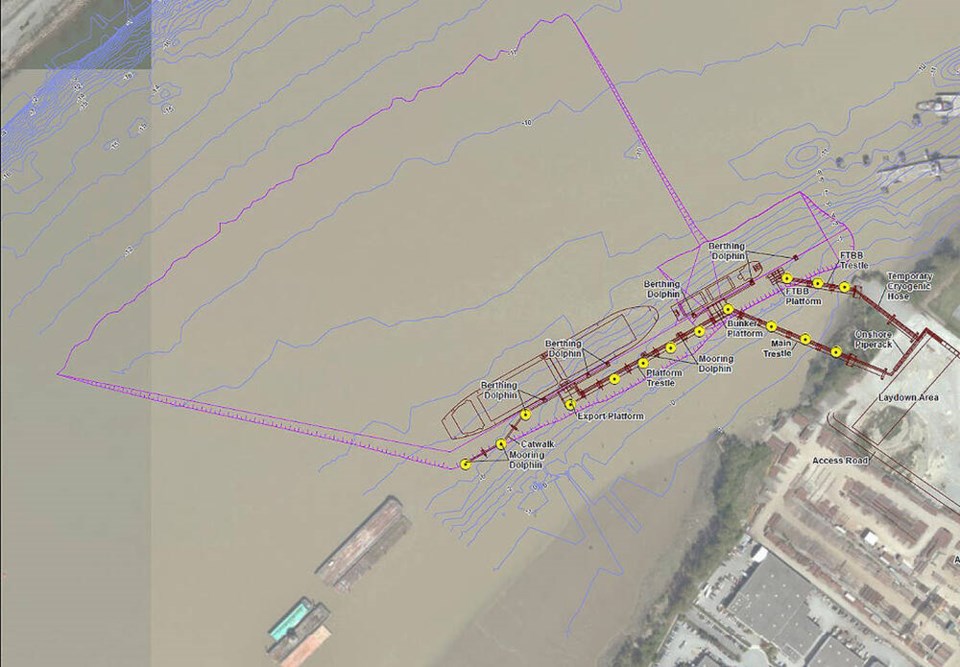The B.C. government today (March 27) announced that an environmental assessment certificate has been issued for the Tilbury Marine Jetty Project on Tilbury Island in Delta.
George Heyman, Minister of Environment and Climate Change Strategy, and Rob Fleming, Minister of Transportation and Infrastructure, made the decision after “carefully considering the environmental assessment of the proposal conducted by B.C.’s Environmental Assessment Office (EAO),” according to the province in an afternoon news release.
Still requiring federal approvals and provincial permits and authorizations before construction can start, the proposed liquefied natural gas (LNG) fuelling jetty will be used to fill carrier ships exporting LNG and bunkering vessels that then refuel ships in other locations. The project will be supplied from the existing adjacent FortisBC Tilbury LNG plant.
The provincial news release notes that the assessment involved extensive consultation with technical experts, federal and local authorities, First Nations and Indigenous groups, as well as the public, adding that the ministers concluded that provincial requirements would avoid or minimize the potential negative impacts of the project in areas of provincial interest.
“In making their decision to issue a certificate to Tilbury Jetty GP Inc., the ministers considered the views of First Nations, the marine transportation project’s footprint, and the role that LNG and, in future, renewable fuel can play in decarbonizing the marine shipping industry. After extensive consideration of marine fuel decarbonization pathways, the ministers included a condition that will require the Tilbury marine jetty to make fuelling space available for renewable fuels to the extent that demand and supply exist,” the Ministry of Environment and Climate Change Strategy explains.
The B.C. EAO carried out the assessment on behalf of the federal government under a “substitution agreement” to avoid duplication of two assessments for a single project.
Although the BC EAO concluded that the residual effects from the project alone would not be significant, there would be cumulative impacts on Indigenous groups.
The ministers issued a certificate with 22 legally enforceable provincial conditions that must be followed over the life of the project by Tilbury Jetty GP Inc. including, among other things, plans to reduce greenhouse gas emissions and opportunities for First Nations’ monitoring of construction and operations.
The jetty project is not dependent on the adjacent proposed FortisBC Tilbury expansion, the province notes.
Following Wednesday’s announcement on the jetty project, it didn’t take long for opponents to voice concern including the Wilderness Committee, noting, among other concerns, it was opposed by the cities of Richmond, Burnaby, Port Moody, New Westminster and Vancouver in part because it violates Metro Vancouver’s air quality goals.
“Clearly, the provincial government saw the opposition from local residents and communities during the hottest year on record and after the worst wildfire season in B.C. history and decided to side with the fossil fuel industry anyway,” said Climate Campaigner Peter McCartney in a news release. “When gas companies are lobbying them three times a day, I’m starting to question whether the government is even capable of saying no to them.”
The host City of Delta continues to take a neutral stand on the project as well as FortisBC’s proposed LNG facility expansion, which is undergoing its own separate assessment.
In 2022, the Metro Vancouver board was set to vote on a recommendation from the regional district’s Climate Action Committee for the district to convey opposition to the FortisBC Tilbury plant expansion, as well as the Tilbury Marine Jetty Project, because “of overall concerns related to upstream and downstream greenhouse gas emissions and inconsistency with Metro Vancouver climate targets.”
The committee had received a report from staff critical of both projects.
Noting the environmental assessment process is not political, Delta Mayor George Harvie asked the board to do likewise and await the outcome of the assessments.
Harvie also noted his city council made sure that the environmental assessment was completed for the Port of Vancouver’s proposed Terminal 2 expansion before expressing opposition to that project to the federal government.
The board agreed at that time to defer.
The jetty proposal was formerly called the WesPac Tilbury Marine Jetty Project but later renamed with a new proponent.




